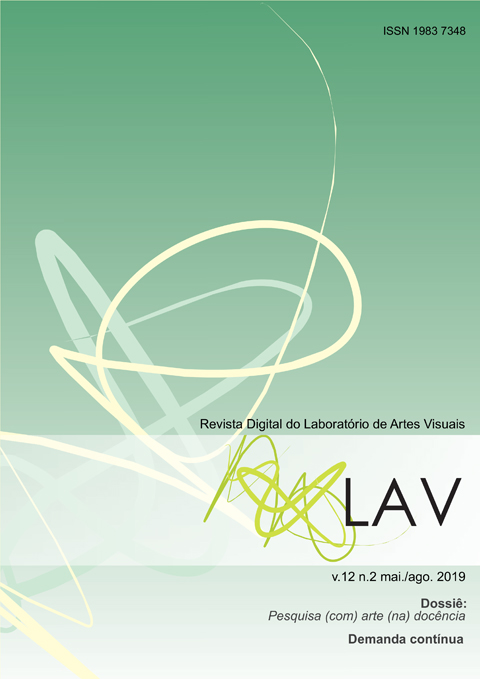Arte, pesquisa e ensino em tempos de deslegitimação do Ensino das Artes
DOI:
https://doi.org/10.5902/1983734837783Parole chiave:
Arte, Pesquisa, Ensino, Ensino das Artes, DeslegitimaçãoAbstract
Neste ensaio, discuto as relações entre arte, pesquisa e ensino em referência tanto a um processo recente, reacionário ou difamatório, de desacreditação das artes e da educação, quanto a um processo de deslegitimação mais amplo, notoriamente tematizado por Jean-François Lyotard. Nesse percurso, avalio alguns deslocamentos no interior do Ensino das Artes, relativos à utilização das artes como metodologia pelas vertentes teóricas ligadas à proposição de pesquisas educacionais baseadas nas artes. Em contraponto, meu argumento passa pela ideia de uma invenção do ensino-pesquisa, para a qual trago como exemplo o trabalho da agência de pesquisa Forensic Architecture.
Downloads
Riferimenti bibliografici
ALVESSON, Mats & SKÖLDBERG, Kaj. Reflexive methodology: New vistas for qualita-tive research. London: Sage, 2001.
BARONE, Tom. Guest Editorial: Arts-Based Educational Research Then, Now, and Later. Studies in Art Education, v. 48, n. 1, 2006, p. 4-8. Disponível em: https://bit.ly/2JSY3FG. Acesso em: 29 mar. 2019.
BARONE, Tom & EISNER, Elliot. Arts-Based Educational Research. S.l.: s.n., s.d., p. 95-109. [PDF]
BOLT, Barbara. Material Thinking and the Agency of Matter. Studies in Material Thin-king, v. 1, n. 1, abr. 2007, 4 p. Disponível em: http://bit.ly/2GvTm12. Acesso em: 19 abr. 2019.
CARVALHO, José Jorge de. A Prática da Extensão como Resistência ao Eurocen-trismo, ao Racismo e à Mercantilizição da Universidade. Porto Alegre: s.n., 2004. [PDF, 23 p.]
FULLERTON, Elizabeth. Political, forensic, hi-tech: how 'research architecture' is re-defining art. The Guardian, 06 jan. 2019. Disponível em: https://bit.ly/2CVexYg. Acesso em: 4 abr. 2019.
GAZTAMBIDE-FERNÁNDEZ, Rubén. Why the Arts Don’t do Anything: Toward a New Vision for Cultural Production in Education. Harvard Educational Review, v. 83, n. 1, p. 660-685, Spring 2013. Disponível em: http://bit.ly/2jQEtNa. Acesso em: 5 abr. 2019.
GROYS, Boris. Education by Infection. In: MADOFF, Steven H. (ed.). Art School: Pro-positions for the 21st century. Cambridge, London: MIT Press, 2009, p. 25-32.
HONORATO, Cayo. Discursos de autolegitimação do ensino da arte: alguns prob-lemas histórico-conceituais. Gearte, v. 5, n. 3, 2018, p. 539-551. Disponível em: https://bit.ly/2CPoiXL. Acesso em: 31 mar. 2019.
IRWIN, Rita et al. A/r/tography Around the World: An Ever Evolving Methodology and Practice. S.l.: s.n., 2017, 29 p. [PDF] [Chapter 28]
LIPOVETSKY, Gilles & SERROY, Jean. A estetização do mundo: viver na era do capi-talismo artista; tradução de Eduardo Brandão. São Paulo: Companhia das Letras, 2015.
LYOTARD, Jean-François. Les problèmes du savoir dans les sociétés industrielles les plus développées. Québec: Conseil des Université du Québec, 1980.
___. The postmodern condition: a report on knowledge. Manchester: Manchester University Press, 1984.
___. A condição pós-moderna. 12 ed. Rio de Janeiro: José Olympio, 2009.
OURY, Jean. O coletivo. São Paulo: Hucitec, 2009.
SERRES, Michel. Polegarzinha. Rio de Janeiro: Bertrand Brasil, 2013.
SPRINGGAY, Stephanie & IRWIN, Rita. A/r/tography as living inquiry through art and text. Qualitative Inquiry, v. 11, n. 6, 2005, p. 897-912. Disponível em: https://bit.ly/2I3bkcd. Acesso em: 29 mar. 2019.
TATE. Forensic Architecture | Turner Prize Nominee 2018 | TateShots [Vídeo no YouTube, 5’21”]. Disponível em: https://bit.ly/2WOtQcF. Acesso em: 4 abr. 2019.
TAZZIOLI, Martina. Between visible and undetectable violence. Radical Philosophy, 2.02, junho de 2018, p. 97-100. Disponível em: https://bit.ly/2JF6ejG. Acesso em: 4 abr. 2019.
WEIZMAN, Eyal. Forensic Architecture: Violence at the threshold of detectability. Brooklyn, NY: Zone Books, 2017.






